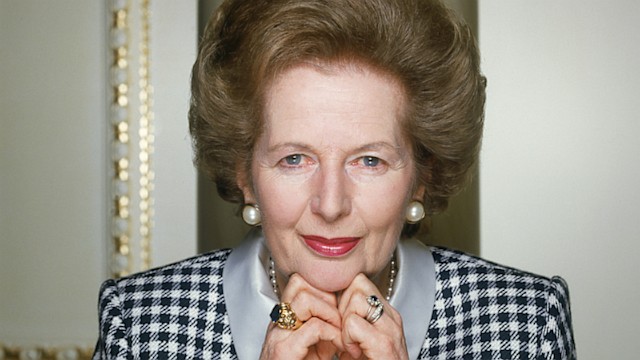“The desire to win is born in most of us. The will to win is a matter of training. The manner of winning is a matter of honour.”
-Denis Thatcher
After winning Best Actress for her performance in The Iron Lady, Meryl Streep had this to say to her husband, who was sitting in the front row:
“First, I’m going to thank Don, because when you thank your husband at the end of the speech, they play him out with the music, and I want him to know that everything I value most in our lives, you’ve given me.”
The remark was made to a man who has largely remained behind the scenes during his wife’s illustrious career. Their marriage has been famously successful—famous because being married to someone far more famous and powerful than you are doesn’t always work.
Fittingly, Streep’s appeal to her husband made her bear an even greater resemblance to the woman she portrayed on screen: Margaret Thatcher.
Thatcher, who for two decades was one of the most powerful women in the world, married a man who tried to avoid the spotlight if at all possible. Their marriage was still going strong after fifty years, and spanned the gamut of Thatcher’s remarkable career.
The question is: how did they make it work?
The Iron Lady
Margaret Thatcher had a man’s job before it was cool. As the first woman to lead a major European democracy, she went on to win three consecutive elections in Britain, carving a legacy for herself as the longest-reigning Prime Minister in British history.
Politics aside, she was known for the sheer strength of her resolve. When the IRA launched an attack on her hotel room in 1984, she famously refused to cancel her scheduled speech the next day, in defiance of her would-be assassins. She handled diplomatic and foreign affairs with independence, conviction, and “eyes like heat-seeking missiles.”
It is worth asking, then, how a politician of mythic proportions managed to be a wife and mother at the same time. Especially when Thatcher lived by the following motto: “I will never be one of those women who stays silent on the arm of her husband.”
Well, it would seem as though she succeeded. Indeed, it was her husband who ended up staying silently on her arm.
Heart of Gold
Margaret met Denis Thatcher in 1949, when she was a twenty-three year-old research chemist. Was it love at first sight? According to Denis: “Certainly not.” However, he was drawn to her “shapely legs,” and while on holiday some time later, suddenly thought: “That’s the girl.” They married in 1951.
A self-described shy person, Denis Thatcher refused all interview requests and referred to the press as “reptiles.” Dignified and gentlemanly, he was seen by many as a bastion of good manners in a world that seemed to have lost them. His sister once said of him:
“He was terribly serious when he was young. Mother used to say outrageous things, and Den would say, ‘Mother, must you?’ ”
While often ridiculed for a somewhat cartoonish English crustiness, Denis was on the whole treated with affection by the public—perhaps because of his dry sense of humor and unexpected moments of bluntness. When the Duchess of York complained to him of her image – “oh, Denis, I do get awful press, don’t I?” – he replied, unabashed: “Yes, ma’am: has it occurred to you to keep your mouth shut?”
Backseat Driver?
The marriage between the Thatchers was one of the most successful in political history. While Denis has too often been called a milquetoast—a washed-out, emasculated figure in Thatcher’s grand political theater—he handled the tricky position of being a Prime Minister’s husband with grace and poise.
“For 40 wonderful years I have been married to one of the greatest women the world has ever produced,” he said. “All I could produce – small as it may be – was love and loyalty.”
They were not inconsequential traits. As Margaret Thatcher recalled:
“I could never have been prime minister for more than 11 years without Denis at my side. . . He was a fund of shrewd advice and penetrating comment. And he very sensibly saved these for me rather than the outside world.”
Competition, it seemed, was nowhere present in their relationship—nor was a resentment of the other’s successes or failures. While each had two distinct and often opposing personalities, they acted as compliments to each other. They achieved a sense of balance that would be impossible to achieve outside the lens of an intimate relationship.
As Thatcher herself wrote:
“Being Prime Minister is a lonely job. In a sense, it ought to be – you cannot lead from a crowd. But with Denis there I was never alone. What a man. What a husband. What a friend.”
***
It is disappointing to many that Streep failed to acknowledge Thatcher in her acceptance speech—and that the film in general may have misrepresented some of Thatcher’s own character.
But while Thatcher didn’t go home with an Oscar, it was at least fitting that another Iron Lady did it in her place. Renowned by many as the greatest actress of our generation, Meryl Streep is not entirely dissimilar to the woman she portrayed on screen—minus the bit about running a country.
During the Oscars, Streep made a point of summing up what was most important to her: love.
“The thing that counts the most with me is the friendships and the love, and the sheer joy we have shared.”
As the legacy of both women goes to show, it is not impossible to achieve great things while maintaining the relationships that matter the most.






